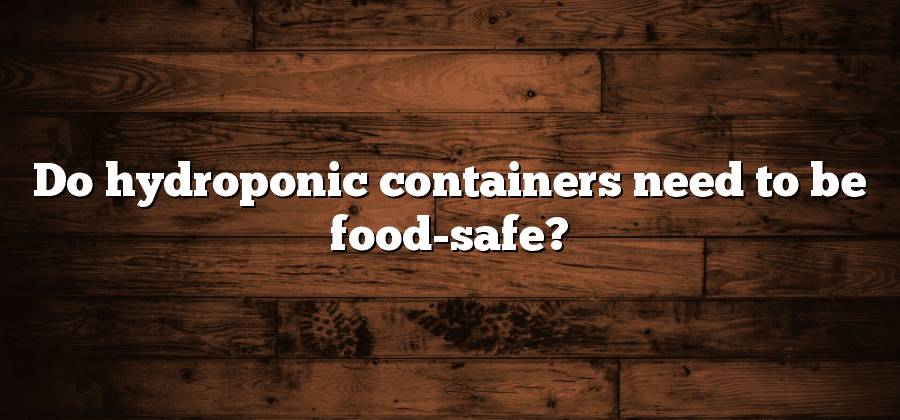Understanding Hydroponic Containers
There are several key components to consider when it comes to understanding hydroponic containers. Firstly, it is important to note that hydroponic containers serve as the foundation for the entire hydroponic system. These containers provide a controlled environment for the plants, allowing them to grow without soil. They come in various shapes and sizes, ranging from small individual pots to large troughs or tanks. Additionally, hydroponic containers must be designed to hold and distribute the nutrient solution efficiently, as this solution is what provides the necessary nutrients for plant growth.
Furthermore, the material of the hydroponic container plays a vital role in the success of the hydroponic system. It is crucial to choose materials that are durable, non-toxic, and resistant to water and nutrient solution. Common materials used for hydroponic containers include plastic, such as PVC or polyethylene, as well as glass and stainless steel. Each material has its advantages and disadvantages, so it is important to consider factors such as cost, ease of cleaning, and compatibility with the chosen hydroponic system. By carefully understanding the different aspects of hydroponic containers, growers can make informed decisions to optimize their hydroponic setups and ensure healthy plant growth.
Importance of Food Safety in Hydroponics
Hydroponics, a method of growing plants without soil, has gained popularity due to its numerous benefits such as increased yield and reduced use of water and pesticides. However, as with any agricultural practice, ensuring food safety is paramount in hydroponics. Food safety involves taking measures to prevent contamination of plants and produce, ensuring that they are safe for consumption.
One of the primary reasons why food safety is essential in hydroponics is the potential for contamination from various sources. The use of water as the main medium for delivering nutrients to plants creates a perfect environment for the growth of bacteria and other microorganisms. If the water used in hydroponic systems is contaminated with harmful bacteria or chemicals, it can pose a serious health risk to consumers. Additionally, improper handling and storage of plants, such as using contaminated containers, can also lead to foodborne illnesses.
Potential Risks of Contaminated Hydroponic Containers
Hydroponic containers play a crucial role in the success of a hydroponic system. However, there are potential risks associated with using contaminated containers. One of the main risks is the introduction of pathogens and harmful bacteria into the nutrient solution. Contaminated containers can harbor these microorganisms, which can then be transferred to the plants, leading to plant diseases and reduced crop yields.
Another risk of using contaminated hydroponic containers is the possibility of chemical contamination. Some containers may contain residues of pesticides, fertilizers, or other chemicals that were previously used in traditional farming. When these containers are used in hydroponics, these residues can leach into the nutrient solution and be taken up by the plants. This can not only compromise the quality and safety of the produce but also pose health risks to the consumers.
Regulations and Standards for Food-Safe Containers
Hydroponic farming has gained popularity in recent years due to its efficiency and ability to maximize crop yield. However, it is important to ensure that the containers used in hydroponic systems adhere to regulations and standards for food safety.
Food safety regulations are put in place to protect consumers from potential health risks associated with contaminated containers. These regulations establish guidelines for the materials, construction, and maintenance of hydroponic containers to minimize the risk of bacterial or chemical contamination. By following these regulations and standards, farmers can ensure that their hydroponic crops are safe for consumption and meet the highest quality standards. Additionally, compliance with food safety regulations also helps build consumer trust and confidence in hydroponic farming practices.
Choosing Food-Safe Materials for Hydroponic Containers
Choosing the right materials for hydroponic containers is essential to ensure the safety and quality of the produce grown. Food safety is of utmost importance, as any contamination can have adverse effects on both the plants and the consumers. When selecting materials for hydroponic containers, it is crucial to consider their compatibility with the system, durability, and ability to maintain a sterile environment.
One of the primary considerations when choosing food-safe materials for hydroponic containers is the potential for leaching harmful substances into the nutrient solution. Containers made from non-toxic materials, such as food-grade plastics or stainless steel, are highly recommended. These materials have been specifically designed to be safe for direct contact with food and are less likely to release harmful chemicals or contaminants into the water. In addition to being food-safe, these materials should also be resistant to corrosion and sterilizable to maintain a clean and hygienic growing environment. Overall, selecting the right materials for hydroponic containers plays a vital role in ensuring the safety and quality of the final produce.






